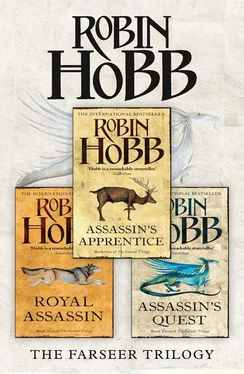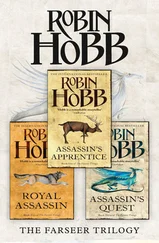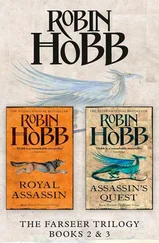I must have succeeded in this, for presently my litter began to move more slowly, to allow me more time to see things, and the women to point to anything they thought I might have missed noticing. They spoke to me in Chyurda, and were delighted to find I had a crude understanding of their language. Chade had taught me the little he knew, but he had not prepared me for how musical the language was, and it soon became apparent to me that the note of word was as important as the pronunciation. Fortunately, I had a quick ear for languages, so I blundered manfully into conversation with my bearers, resolved that by the time I spoke to my betters in the palace, I would no longer sound quite so much an outland fool. One woman undertook to give me a commentary on all we passed. Jonqui, her name was, and when I told her mine was FitzChivalry, she muttered it to herself several times as if to fix it in her mind.
With great difficulty, I persuaded my bearers to pause once and let me alight to examine a particular garden. It was not the bright flowers that attracted me, but what appeared to be a sort of willow that was growing in spirals and curls rather than the straight willow I was accustomed to. I ran my fingers along the supple bark of one limb and felt sure I could persuade a cutting to sprout, but dared not take a piece of it, lest it be construed as rude. One old woman stooped down beside me, grinned, and then ran her hand across the tops of a low-growing, tiny-leaved bed of herbs. The fragrance that arose from the stirred leaves was astounding, and she laughed aloud at the delight on my face. I would have liked to linger longer, but my bearers emphatically insisted that we must hurry to catch up with the others before they reached the palace. I gathered there was to be an official welcoming, one I must not miss.
Our procession wound up a terraced street, ever higher, until our litters were set down outside a palace that was a cluster of the bright, bud-like structures. The main buildings were purple tipped with white, putting me in mind of the roadside lupin and beach-pea flowers of Buck. I stood beside my litter, staring up at the palace, but when I turned to my bearers to indicate my pleasure in it, they were gone. They reappeared moments later, robed in saffron and azure, peach and rose, as did the other bearers, and walked among us, offering us basins of scented water and soft cloths to wash the dust and weariness from our faces and necks. Boys and young men in belted blue tunics brought a berry wine and tiny honey cakes. When every guest was washed and greeted with wine and honey, we then were bade to follow them into the palace.
The interior of the palace was as foreign to me as the rest of Jhaampe. A great central pillar supported the main structure, and closer examination showed it to be the immense trunk of a tree, with the swells of its roots still obvious beneath the paving stones around its base. The supports of the gracefully curving walls were likewise trees, and days later I was to find that the ‘growing’ of the palace had taken almost one hundred years. A central tree had been selected, the area cleared, and then the circle of supporting trees planted and tended, and shaped during their growing by ropes and pruning, so that they all bowed toward the centre tree. At some point all other branches had been lopped away and the treetops interwoven to form a crown. Then the walls had been created, first with a layer of finely-woven fabric, that was then varnished to hardness, and then overlaid with lapping after lapping of sturdy cloth made from bark. The bark-cloth was daubed over with a peculiar local clay, and then coated with a bright layer of resinous paint. I never did discover if every building in the city had been created in this laborious fashion, but the ‘growing’ of the palace had enabled its creators to give it a living grace that stone could never mimic.
The immense interior was open, not unlike the great hall at Buckkeep, with a similar number of hearths. There were tables set out, and areas obviously for cooking and weaving and spinning and preserving, and all the other necessities of a great household. The private chambers seemed to be no more than curtained alcoves, or rooms like small tents set against the exterior wall. There were also some elevated chambers, reached by a network of open wooden stairs, reminding me of tents pitched on stilt platforms. The supporting legs of these chambers were natural tree-trunks. My heart sank as I realized how little privacy there would be for any ‘quiet’ work I needed to do.
I was shown quickly to a tent chamber. Inside I found my cedar chest and clothing bag awaiting me, as well as more warm and scented wash-water and a dish of fruit. I changed quickly from my dusty travelling clothes into an embroidered robe with slit sleeves and matching green leggings that Mistress Hasty had decreed as appropriate. I wondered once more at the threatening buck embroidered on it, then set it out of my mind. Perhaps Verity had thought this changed crest less humiliating than the one that so clearly proclaimed my illegitimacy. In any case, it would serve. I heard chimes and small drums from the great central room, and left my chamber hurriedly to find out what was afoot.
On a dais set before the great trunk and decorated with flowers and evergreen swags, August and Regal stood before an old man flanked by two servants in plain white robes. A crowd had gathered in a great circle around the dais, and I quickly joined them. One of my litter-bearers, now robed in rose drapings and crowned with a twining of ivy, soon appeared at my side. She smiled down at me.
‘What is happening?’ I made bold to ask.
‘Our Sacrifice, er, ah, you say, King Eyod will welcome you. And he will show to you all his daughter, to be your Sacrifice, hem, ah, queen. And his son, who will rule for her here.’ She stumbled through this explanation, with many a pause, and many encouraging nods from me.
With mutual difficulty, she explained that the woman standing beside King Eyod was her niece and I awkwardly managed a compliment to the effect that she looked both healthy and strong. At the moment it seemed the kindest thing I could find to say of the impressive woman standing so protectively by her king. She had an immense mass of the yellow hair that I was becoming accustomed to in Jhaampe, with some of it braided up and coiled about her head, and some flowing loose down her back. Her face was grave, her bare arms muscular. The man on the other side of King Eyod was older, but still as like to her as a twin, save that his hair was cut severely short at his collar. He had the same jade eyes, straight nose and solemn mouth. When I managed to ask the old woman if he, too, were a relative, she smiled as if I must be a bit dim, and replied that, of course, he was her nephew. She shushed me then, as if I were but a child, for King Eyod was speaking.
He spoke slowly and carefully, but even so, I was glad of my conversations with my litter-bearers, for I was able to make out most of his speech. He greeted us all formally, including Regal, for he said that previously he had greeted him only as the emissary of King Shrewd and now he greeted him as Prince Verity’s symbol of his presence. August was included in this greeting, and both were presented with several gifts, jewelled daggers, a precious fragrant oil, and rich fur stoles. When the stoles were placed about their shoulders, I thought with chagrin that both now looked more like decorations than princes, for in contrast to the simple garb of King Eyod and his attendants, Regal and August were decked in circlets and rings, and their garments were of opulently rich fabrics and cut with no regard for either thrift or service. To me, they both appeared foppish and vain, but I hoped that our hosts would merely think their outlandish appearance was part of our foreign customs.
Читать дальше












